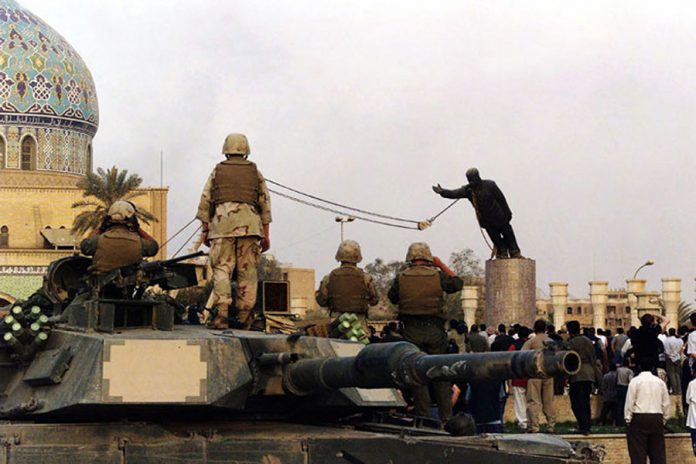Abstract
Iraq has at least 115 billion barrels of known oil reserves – 10 per cent of the world total. Oil accounts for more than 70 per cent of Iraq’s GDP and 95 per cent of government revenue. The motive for the Bush administration in going to war was oil.
US occupation in Iraq has led to a civil war in Iraq. The Iraqi government is too week to control militia and extremists who have been killing people everyday. The nature of the war has changed as two religious groups Shiite and Sunnis have deep differences in US occupation. Iraq has become a perfect place for Al Qaeda and its allies to launch offensive operations against US troops as well as Shiite’s. The longer the US troop’s remains in Iraq, heavier will be the consequences in terms of both human loses and economy. More than 2,500 American troops have died and close to 20,000 have been wounded since Operation Iraqi Freedom began and this figure will continue to grow. The U.S. death toll for May has risen to 112, making it the deadliest month so far this year, billions of dollars have been invested, and the relation with Arab world has been jeopardized. If the war continues to grow, then US will face heavier economic consequences, as well as oppositions in the country and low army moral. For this, Iraq issue must be solved by involving Middle East countries such as Turkey, Iran, Syria and the Gulf States and the focus should be on the Iraqi people, their norms, and beliefs.
Bush Administration, defend the accusation that occupation of Iraq to gain control over that Iraq huge oil reserves by saying it is “nonsense” and “a myth.” created against, The US interests. But, in February, 2007, the proposed draft of a new law to structure Iraq’s oil industry was leaked, and it is being proved by the people of Iraq, parliament, and other nations that so called “Liberation of Iraq” was not the case. The US draft bill has several key features that indicate that invasion of Iraq was Iraqi oil. As the draft presented by the George W Bush it indicates:
1. Allow two-thirds of Iraq’s oil fields to be developed by private oil corporations. In contrast, the oil industry has been nationalized in every other major Middle Eastern producer for over 30 years.
2. Place governing decisions over oil in a new body known as the Iraqi Federal Oil and Gas Council, which may include foreign oil companies;
3. Open the door for foreign oil companies to lock up decades-long deals now, when the Iraqi government is at its weakest.
Basically, this draft will secure the interests of big giants such as ExxonMobil, Chevon, British Petroleum, and the other major’s oil companies of US, the proposed of bill would be looting Iraqi people of their most basic source of wealth. It is estimated that Iraq has 115 billion barrels of proven reserves ($7 trillion worth at $64 per barrel) and another 215 billion possible or likely ($14 trillion), there will be a million dollars of oil for every Iraqi citizen.
According to a recent statement by the combined leadership of Iraqi Unions:
Iraqi public opinion strongly opposes the handing of authority and control over the oil to foreign companies, that aim to make big profits at the expense of the people. They aim to rob Iraq’s national wealth by virtue of unfair, long term oil contracts that undermine the sovereignty of the State and the dignity of the Iraqi people.
The US Pulling out of Iraq has three major consequences that it can avoid if it pulls out of Iraq economically, politically, and strategically. In the article, “Should the United States pull troops out of Iraq and surrounding countries?”, Bernadette Brandle says, “My reasoning is what more are they supposed to be accomplishing that they haven’t already done?” In this article the writer believes President Bush already knew that Iraq did not have WMD, but he sent the troops anyway. President Bush asked troops to capture and they did. Infrastructure of Iraq is also on a rebuilding process. President Bush asked US troops to train Iraqi police and member of the new Iraqi Army this too they did. Whatever, Mr. President has asked the troops to do they have done it. But, why there is a delay? The writer believes that the US troops have done everything that was asked of them and now there is no reason to stay there, so troops deserves to come home.
International Herald Tribute on March 16th 2007 publishes the opinion of the French Prime Minister Dominique de Villepin, in this newspaper article; the French Prime Minister argues that US should pull out of Iraq as soon as possible. He believes that the crisis should be resolved by the Middle East. This point is best summed up when he says, “States in the region, from Turkey to Iran, from Syria to the Gulf States, must be mobilized in support of this process to ensure Iraq’s territorial integrity”.
Columbia University’s Jeffrey Sachs has written an editorial for the Lebanese Paper, L’Orient Le-Jour, calling for the immediate pullout of US troops from Iraq. In this website called Nuralcubicle Jeffrey writes that oil is the major reasons of US occupation in Iraq. And at the same time US wants to establish military bases in the Middle East and take control of the region. And this effort is costlier as the writer says, “The United States is going to lay out more then $500 billion, or 5% of its GNP, on military spending this year, half of the aggregate total in the world. In other words, the United States spends as much per year on weaponry as the rest of the world combined”.
Currently, the Defense Department says it is spending about $4.5 billion a month on the conflict in Iraq, or about $100,000 per minute. It is expected that by the end of the 2010 US expenditure in Iraq war would exceed 600 billion dollars. The major factors expenses factors are Rebuilding post war military, budgetary cost of the war, economic cost of the war, Military Fatalities, Serious Casualties and Reserves Wage Differential, and many unpredictable factors. In spite of, US investing on infrastructures such as schools, roads, electricity, communication facilities, the Iraqi resistance has grown larger, stronger and more popular in the last two years, in response to the U.S. invasion and occupation. In November 2003 the Pentagon estimated that there were about 5,000 Iraqi resistance fighters. By December 2004 the Iraqi “interim government” estimated that the number had grown to approximately 40,000 active military forces and 200,000 supporters in the resistance. By the beginning of 2007 this figure has grown into million. The continuing presence of the U.S. troops has strengthened, not weakened, the resistance as in everyday we can see and hear news of road-side bomb, kidnappings suicides attacks against US troops and the institution associated with U.S. occupation forces. Such as Iraqi police officers, coalition forces, contractors, government officials, and civilian employees.
The US policy with Iraq before the September 11 was touch and go policy. But, Aftermath of the September 11, President George W Bush declared Iraq, North Korea, and Iran posses a great threat to the United States, and said these nations are “Access of an evil” he declared war against terror. US led campaign “war against terror” made its initial success in Afghanistan. Attacking, Iraq in an assumption of so-called “Weapons of mass destruction” was a blunder. As a result, more then 3,456 US troops have been killed; thousands of them have been seriously wounded or lost their organs. Everyday, hundreds of people are killed by the extremists, insurgents, and the terrorists. It doesn’t surprise us even if hundred of people are dead in Iraq. Neither Iraqi government nor, US has any control to stop these extremists from bombing or killing people. Due to the civil war in Iraq, Education, human rights, and health-care have been badly affected. Adil Shamoo, who is also a professor at the University of Maryland at School of Medicine in his article, “The Destruction of Iraqi Healthcare Infrastructure” published on June 1 2007 writes, After the invasion in Iraq by the US ten’s of thousand’s of doctors have fled the country and moved to else where. Even though, they are needed in the country. Two thousand doctors have been killed. And some of the hospitals lack the basic elements of care: hygiene, clean water, antibiotics, anesthetics and other basic drugs. Oxygen, gauze, rubber gloves, and diagnostic instruments such as X-rays are absent or rarely evident. He further says, after the two wars, one in the 1990’s and the other in 2003 with the United States, the healthcare of Iraq has been destroyed. Before the invasion Iraq’s health-care system was considered as one of the best in the Middle East. Iraq had well-trained physicians and modern facilities. Today, the healthcare system barely exists at all, with few healthcare workers and hospitals that are battlegrounds.
President George. W. Bush and his administration might say attacking Iraq was inevitable because Saddam possessed a great threat of WMD. Attacking Iraq was well planned; the only factor it was lacking was cultural norms, and beliefs of the Iraqi people. People of the Iraq wanted Saddam to be overthrown. That does not mean they wanted the United States to occupy their country.
Phyllis Bennis and Erik Leaver of Institute for policy studies, in their article “Ending the US war in Iraq” suggests how US can end the Iraq war and the major action in this regard are Ceasing all offensive actions and depart from population centers, Close the 14 or more permanent and/or long-term military bases the U.S. has established in Iraq, Insist that the U.S.-dependent “interim government” in Iraq immediately postpone the scheduled January 30th national elections. Announce that the U.S. embassy in Baghdad will be reduced to “normal” size and authority, Declare that it has no intention of maintaining control, officially or through surrogates, over Iraq’s oil, oil fields or oil production capacity, Cut off U.S. spending for the Iraq War, Halt the rampant war profiteering that has caused widespread waste, fraud, and abuse. Cancel or revoke all U.S.-issued contracts to U.S. and other foreign corporations working in Iraq, Ensure that all Iraqi funds – including oil revenues and money from previously frozen accounts – are removed from U.S. government control and returned to Iraqi control, Return any funds remaining in the U.S.-controlled Development Fund for Iraq to Iraq, Create a U.S.-financed multi-billion dollar fund for reparations and reconstruction in Iraq, structural adjustment programs, Minimize Chances of Civil War.
The action has started to take place as the United States broke diplomatic relations with Tehran and offered a talk which took place in the Green Zone offices, of Iraqi Prime Minister Nouri al-Maliki. It was the first formal and scheduled meeting between Iranian and American government officials after the 1979. U.S. Ambassador Ryan Crocker says, “We don’t have a formal invitation to respond to just yet, so it doesn’t make sense to respond to what we don’t have”. The statement of Ryan Crocker, “the level of policy and principle, the Iranian position as articulated by the Iranian ambassador was very close to our own” was a positive step towards involving Iran and other Gulf States to solve the Iraq issue by politically rather then force..
Aftermath of the Iraq war, situation of Iraq has badly affected millions of people have died, and more then 400 billion dollars have been spent. The companies like Exxon, BP, Chevon, and the other major’s oil companies of US should stop playing the politics with the government such as Invading Iraq, for their profits. Iraq issue should be solved by involving Middle East countries through dialogues. Everyone should understand that Killing is not an option. !!. If we exemplify by what happens if we invade, occupy, and control the formation of the country: how badly the future of children’s, workers, citizens, the economy, religion, and the nation will damage. To escape such a grave situation war must come to and end.
– Bibek Karki










































